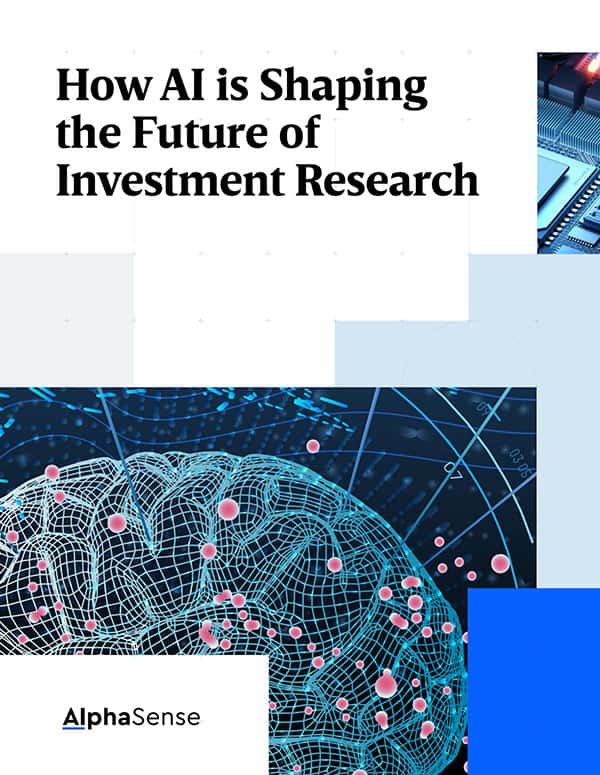There’s never a right time to be outpaced by competitors, but an economic downturn and looming recession is an especially bad time. It’s no surprise, then, that despite tightening budgets across industries, we see top companies investing more money and headcount into market intelligence functions.
Even so, market intelligence professionals continue to face challenges in navigating a high noise-to-signal ratio–and as the amount of data and information grows exponentially, so too does the cognitive fatigue from trying to cut through the noise in a timely fashion. For those stuck operating in an environment where information is fragmented across disparate sources with only antiquated and tedious methods—like exact keyword matching and Ctrl+F (or Command+F on a Mac)—for extracting relevant snippets of text, prioritizing research time towards analysis rather than discovery is incredibly challenging.
The Status Quo: Exact Keyword Matching
Let’s take a look at the status quo of research in action:
Say you’re conducting research around layoffs in the tech industry. First, you navigate to Google’s search engine and type in “tech layoffs” to search across news sources. Then, you spend time reading through articles from any of the publications hidden behind paywalls, and compile earnings documents (like call transcripts, 8Ks, 10Qs, etc) from FAANG+ companies. In order to find information across those disparate sources, you are most likely using Ctrl+F to search for mentions of “layoffs” in each of the documents all to try and find relevant sections in the hopes of expediting the process of reviewing this information.
But, even if you do have access to every news, regulatory, and earnings-related document needed to conduct this research, there is still one major problem:
Searching for keywords on Google or within certain documents only pulls results for that exact phrasing, and we all know that writers or call participants may not explicitly say “layoffs” verbatim when discussing reduction of workforce. To account for that, a document would need to be read in its entirety in order to ensure that you didn’t miss any relevant sections. Or alternatively, you would need to come up with all possible ways that the topic of “layoffs” may be phrased (like “workforce reduction”, “job cuts”, “cutting jobs”, and so forth)—which essentially means having to choose between spending critical time reading through mostly irrelevant text that may or may not contain pertinent information, or potentially miss something because the constructed keyword phrase didn’t exactly match every instance of this topic being discussed.
While more information is always better, limitations on processing and sorting information can make this access ineffective. Without the right tools, you carry the burden of searching across tens of thousands of content sources which effectively eliminates the benefits of living in the information age. Luckily, innovations in artificial intelligence (AI) and machine learning have paved the way for solving this very problem.
The New Frontier: Smart Synonyms
At AlphaSense, we often talk at length about the power of our content—not only the aggregation of public content in one place, but also the access to proprietary documents and first-hand, expert perspectives. In tandem, this content drives a deep understanding of topics and an expedited decision-making process. However, this aggregation is useless without the right tools to search across millions of potentially relevant documents to find valuable information.
Enter, Smart Synonyms™—the backbone of the AlphaSense search engine. This technology allows you to expand keyword and thematic searches to deliver the most relevant results, beyond just those documents that match your keywords exactly. Our industry-leading search technology uses natural language processing (NLP) to analyze speech patterns across tens of millions of source documents, resulting in a robust library of synonymous words, phrases, and word proximity combinations that do the heavy lifting of searching for relevant snippets within text-heavy documents.
Let’s take a look at it in action, using the same search criteria as above:
We start by searching for the keyword “layoffs” across my FAANG+ watchlist (or, alternatively, the Industry filter could be used to search across a wider list of tech companies). Within the first few results, AI picks up on entire documents that would’ve been missed altogether with exact keyword matching—and these are some of the most relevant documents to the initial search that would’ve been completely missed otherwise because, although they talk about the concept extensively, they don’t contain the word “layoffs” anywhere.
While it may seem intuitive to the human brain that “reduce headcount” and “cut jobs” have the same meaning as “layoffs”, search technology that uses exact keyword matching is unable to process these conversational nuances.
Smart Synonyms™ can also be combined with our Sentiment technology to identify and quantify levels of emotion around specific topics within event transcripts and expert interviews. Using a boolean operator, we can search for mentions of a specific topic in a positive or negative light (for example, “automation” AND “positive”) and filter by event transcripts and expert calls. The resulting snippets cover any positive mention of the topic.
Here are just a few examples to demonstrate the breadth of synonymous words and phrases that are returned from this exact search:
- “Robots as growth drivers”
- “Real opportunities that will be addressable by robotics in the future”
- “Enabling technologies like robotics will also be a positive”
- “Looking ahead, recent contract awards and increasing demand for our portfolio of intelligent multi-domain robotic solutions gives us confidence that we are positioned for strong long-term performance and value creation”
Read the full source transcript here
Smart Synonyms, as a part of AlphaSense’s larger search technology, are the linchpin in staying ahead of your competition (and the market). They allow you to reliably offload the majority of tedious aspects of research to AI so that you can spend more time on the tasks that benefit from your differentiated and very human brain: analyzing and contextualizing these snippets and data into critical business decisions.
“[What I like best is the ability to] search thousands of documents in minutes and the accuracy of ‘similar words’ [smart synonyms]”
– Vice President, Enverus
Quadrant Knowledge Solutions (QKS) recently named AlphaSense a market-leading vendor in its 2022 SPARK Matrix analysis of the global Market and Competitive Intelligence market, noting our AI-powered Smart Synonym technology as a major differentiator from the competition.
Don’t miss our Innovator’s Guide to Competitive Intelligence to go from reactive to proactive in your strategy.
Not yet an AlphaSense customer? Check out Smart Synonyms™ (and the rest of our patented search technology) for yourself by signing up for a free trial.







